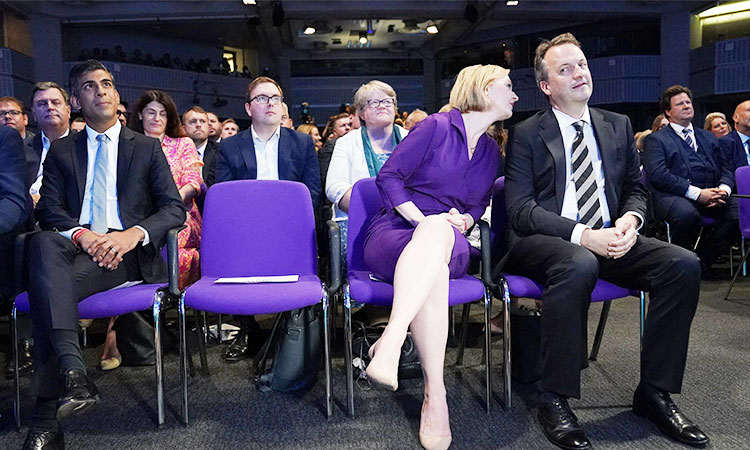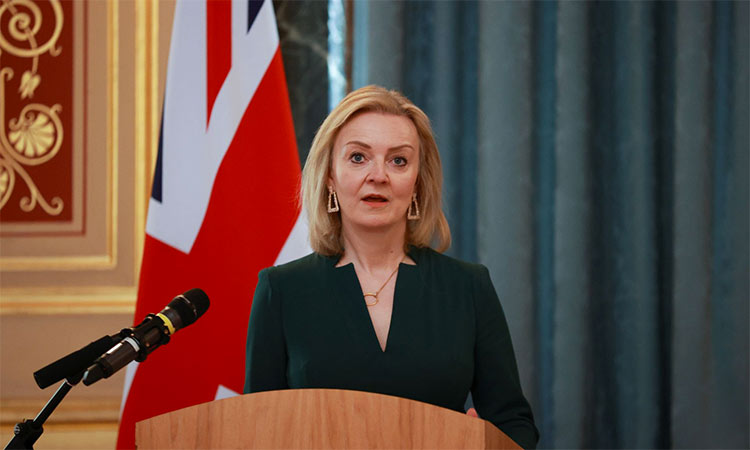Truss faces open Russian hostility from day one

Liz Truss
Among the many foreign politicians who flew to Moscow at the start of this year in an effort to head off an invasion of Ukraine, it was Truss who appeared to annoy Russia’s leadership more than any other.
Foreign Minister Sergei Lavrov described their conversation as like a dialogue between deaf and mute people, complaining that facts had “bounced off” her. Then a Russian newspaper reported that Truss, during their meeting, had inadvertently told Lavrov that Britain would never recognise Moscow’s sovereignty over two Russian cities, Rostov and Voronezh, and had to be corrected by her ambassador.
The Kremlin seized on the error as an example of Western leaders being poorly informed. Britain dismissed that as propaganda and said Truss had simply misheard a question from Lavrov.
Tatiana Stanovaya, founder of political analysis firm R.Politik, said that incident had played a significant role in forming Russia’s attitude to Truss.
“The Kremlin dreams to deal with great, strong and competent leaders. Truss seems to the Kremlin as a representative of this new generation of superficial Western politicians who come and go and are unable to deal with such countries as Russia, think strategically and plan in the long term,” she said.
“They, in the Kremlin, were so happy when she made this mistake. It was a ‘gift’ to use instantly against her.”
Russia also pounced on an earlier gaffe when Truss got mixed up between the Black and Baltic Seas, prompting foreign ministry spokeswoman Maria Zakharova to complain of “the stupidity and ignorance of Anglo-Saxon politicians.”
And the government newspaper mocked Truss for posing in a fur hat on Red Square like her role model Margaret Thatcher, even though the weather during her visit was mild. The openly contemptuous Moscow view of Truss contrasts with the respect that many Russians accorded to Thatcher, regarding her as a formidable opponent and awarding her the nickname of the Iron Lady, which she embraced as a compliment. Speaking before the announcement that Truss had defeated Rishi Sunak in a contest to succeed Boris Johnson as Conservative Party leader and prime minister, Kremlin spokesman Dmitry Peskov said on Monday that relations with London might deteriorate further.
“I wouldn’t like to say that things can change for the worse, because it’s hard to imagine anything worse,” he said when asked if Moscow expected any shift in ties. “But unfortunately, this cannot be ruled out, given that the contenders for the post of British prime minister competed with each other in anti-Russian rhetoric, in threats to take further steps against our country, and so on. Therefore, I don’t think that we can hope for anything positive.”
Political analysts expect Truss to maintain Britain’s stance as one of the most active and vocal supporters of Ukraine, supplying it with weapons and training. Russian hostility may not overly worry her - and may even prove useful - as she sets out to prove her credentials as a strong leader facing up to Moscow over Ukraine. Despite her gaffe during the visit in February, she showed herself able to stand up to the far more experienced Lavrov by publicly challenging his assertion that Russia was not threatening anyone with its vast military build-up on the border with Ukraine. Two weeks later, Russia invaded its neighbour.
Judging by her words as foreign secretary and on the Downing Street campaign trail, the new UK prime minister appears to be itching for a fight with Europe, Russia and China.
Liz Truss’s bellicose tone towards friends and foes alike — even French President Emmanuel Macron has not been immune — has some in the UK security establishment worried.
Defence chiefs forced Truss to backtrack in February when, as foreign secretary, she gave her approval to any Britons wanting to head to Ukraine to fight against the Russian invaders.
The cause of Ukraine became a rallying cry for her predecessor, Boris Johnson. Truss says she would “double down” on his government’s support for Kyiv. “We will keep going further and faster to push Russia out of the whole of Ukraine,” she said in a keynote speech in April, indicating that Moscow must also vacate Crimea, which it annexed in 2014.
The speech, at Mansion House in the City of London financial district, previewed the foreign policy themes that are likely to inform Truss’s world view from 10 Downing Street.
“My vision is a world where free nations are assertive and in the ascendant,” she said.
“Where freedom and democracy are strengthened through a network of economic and security partnerships. Where aggressors are contained and forced to take a better path.” The “aggressors” include Russia — and China.
In late July, Truss promised to build stronger economic and trade ties with Commonwealth nations to counter what she said was China’s “growing malign influence”.
Truss’s vision of likeminded partners in economics and security encompasses Pacific powers Australia and Japan, also as a counter to China.
She has attacked China’s rights record in Xinjiang and Hong Kong, and its economic protectionism.
A UN report last week on the plight of the Uyghurs “shames China in the eyes of the international community,” Truss said. “And we must ensure that democracies like Taiwan are able to defend themselves,” she said in April, before Chinese military drills in early August sent cross-strait tensions soaring.
Protesting the drills, Truss summoned China’s ambassador in London but ruled out visiting Taiwan as prime minister.
Reuters / Agence France-Presse







